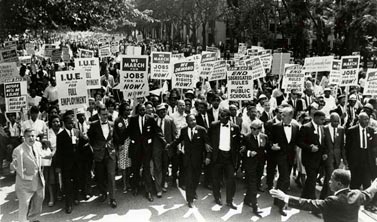Equality on the Job
The long ascent of women workers has been hard-fought, and vestiges of male privilege remain.

Profit and prosper with the best of Kiplinger's advice on investing, taxes, retirement, personal finance and much more. Delivered daily. Enter your email in the box and click Sign Me Up.
You are now subscribed
Your newsletter sign-up was successful
Want to add more newsletters?

Delivered daily
Kiplinger Today
Profit and prosper with the best of Kiplinger's advice on investing, taxes, retirement, personal finance and much more delivered daily. Smart money moves start here.

Sent five days a week
Kiplinger A Step Ahead
Get practical help to make better financial decisions in your everyday life, from spending to savings on top deals.

Delivered daily
Kiplinger Closing Bell
Get today's biggest financial and investing headlines delivered to your inbox every day the U.S. stock market is open.

Sent twice a week
Kiplinger Adviser Intel
Financial pros across the country share best practices and fresh tactics to preserve and grow your wealth.

Delivered weekly
Kiplinger Tax Tips
Trim your federal and state tax bills with practical tax-planning and tax-cutting strategies.

Sent twice a week
Kiplinger Retirement Tips
Your twice-a-week guide to planning and enjoying a financially secure and richly rewarding retirement

Sent bimonthly.
Kiplinger Adviser Angle
Insights for advisers, wealth managers and other financial professionals.

Sent twice a week
Kiplinger Investing Weekly
Your twice-a-week roundup of promising stocks, funds, companies and industries you should consider, ones you should avoid, and why.

Sent weekly for six weeks
Kiplinger Invest for Retirement
Your step-by-step six-part series on how to invest for retirement, from devising a successful strategy to exactly which investments to choose.
Back in 1949, this magazine published a trailblazing cover story titled “Do Working Women Get a Fair Break?”
It was anonymously bylined "By a Working Woman," and it answered the question in the title with an emphatic and caustic no. It laid out the case for workplace equality with cogent arguments that would gradually gain legal traction over the following 25 years.
Accompanying that story was "A Man's Rebuttal," written by an unnamed employer in defense of male preference in the workplace. But the aggrieved woman was given the last word, including this: "Much of what you say, Mr. Employer, is merely the entrenched legend and folklore that prevails among men."
From just $107.88 $24.99 for Kiplinger Personal Finance
Become a smarter, better informed investor. Subscribe from just $107.88 $24.99, plus get up to 4 Special Issues

Sign up for Kiplinger’s Free Newsletters
Profit and prosper with the best of expert advice on investing, taxes, retirement, personal finance and more - straight to your e-mail.
Profit and prosper with the best of expert advice - straight to your e-mail.
Our files don't indicate who wrote those two stories, but I suspect that the woman's point of view was a collaboration among the three professional women -- one writer, one copy editor and the research chief -- among 12 male writers and senior editors. And I suspect that the anonymous employer was the editor in chief, my grandfather, W.M. Kiplinger.
In many ways, W.M. Kiplinger was a very progressive employer for his era -- in his hiring practices (including women and minorities) and in providing rich benefits, profit sharing and gifts of company stock to staff. But in this story, the employer's point of view -- perhaps my grandfather's -- reflected assumptions about women that have long since been discredited.
The employer's position did acknowledge, however, that the winds of change were beginning to blow: "We all know that more and more women are becoming [primary] breadwinners, not only for themselves, but for dependents. ... This fact alone will make great changes in the employment attitudes toward women, but it will take time." He concluded magnanimously: "Note that I have NOT said women's place is the home."
Fair share. In the year that story was written -- four years after men returned from World War II and reclaimed from women their former jobs in factories and offices -- just 28% of the paid labor force in the U.S. was female. Women's share of professional occupations such as law, medicine, accounting, engineering and science was less than 5%. In business management, it was only 3.5%.
Today, women constitute their proportionate 50% of the paid labor force, and they briefly became a majority during the Great Recession, when men lost millions of jobs in construction, manufacturing and finance.
Furthermore, in professional and managerial employment, women hold 52% of the jobs, twice the level they held in 1980. This rate will probably keep rising because young women are earning about 60% of all bachelor's and master's degrees today, and nearly half of the law and medical degrees.
The staffing of this magazine, once aptly titled Changing Times, illustrates this trend. Back in the early '80s, when our staff was still largely male, we were probably the first financial magazine to be headed by a woman, editor Marjorie White. Today, more than half of my colleagues who create the magazine each month are women, led by editor Janet Bodnar. Our women journalists cover investing, taxes, college costs, retirement issues -- and cars.
What about men? The long ascent of women workers has been hard-fought, and vestiges of male privilege remain. But now there is concern that young men -- falling further behind in education -- will become underrepresented in the most promising occupations of a postindustrial economy.
Why this is happening is a complex sociological question I will save for another day. In the meantime, let's all take heart that working women are, at last, getting that "fair break" that seemed so elusive in 1949.
Columnist Knight Kiplinger is editor in chief of this magazine and of The Kiplinger Letter and Kiplinger.com.
Profit and prosper with the best of Kiplinger's advice on investing, taxes, retirement, personal finance and much more. Delivered daily. Enter your email in the box and click Sign Me Up.

Knight came to Kiplinger in 1983, after 13 years in daily newspaper journalism, the last six as Washington bureau chief of the Ottaway Newspapers division of Dow Jones. A frequent speaker before business audiences, he has appeared on NPR, CNN, Fox and CNBC, among other networks. Knight contributes to the weekly Kiplinger Letter.
-
 How to Watch the 2026 Winter Olympics Without Overpaying
How to Watch the 2026 Winter Olympics Without OverpayingHere’s how to stream the 2026 Winter Olympics live, including low-cost viewing options, Peacock access and ways to catch your favorite athletes and events from anywhere.
-
 Here’s How to Stream the Super Bowl for Less
Here’s How to Stream the Super Bowl for LessWe'll show you the least expensive ways to stream football's biggest event.
-
 The Cost of Leaving Your Money in a Low-Rate Account
The Cost of Leaving Your Money in a Low-Rate AccountWhy parking your cash in low-yield accounts could be costing you, and smarter alternatives that preserve liquidity while boosting returns.
-
 R.I.P.: A Good Journalist, Good Boss, Good Father
R.I.P.: A Good Journalist, Good Boss, Good Fatherbusiness Journalist and philanthropist Austin H. Kiplinger led the Kiplinger Washington Editors for decades.
-
 The March on Washington: A Personal Reflection
The March on Washington: A Personal ReflectionPolitics Editor-in-chief Knight Kiplinger looks back to a moment on the mall 50 years ago — and explores how far we've come in realizing the goals outlined that day.
-
Chill Out in a Hot Home Market
real estate The surge in home prices is bringing back the frantic "have to buy now" mentality.
-
Financial Security Is Still Achievable
Financial Planning Social critics argue that financial progress is impossible for most Americans in today's economy. Powerless victims? No way.
-
 5 Financial Tips for Newlyweds
5 Financial Tips for NewlywedsMaking Your Money Last Knight Kiplinger offered his sage advice on money matters for the recently (or soon-to-be) married.
-
What Our Readers Want
Economic Forecasts Our magazine readers are heavy users of electronic media, but they also love print on paper.
-
D.C.'s Economy Is Out of Touch
Economic Forecasts Flattening federal spending will give the region a taste of what the country has been going through.
-
The Future Is Yours
business Whatever quality of life means to you, achieving it is in your hands.